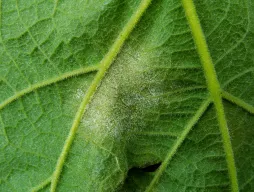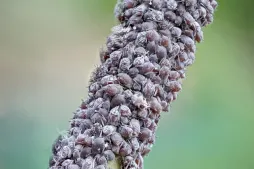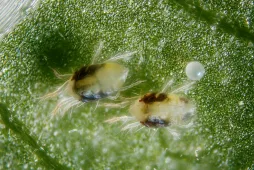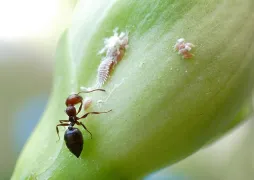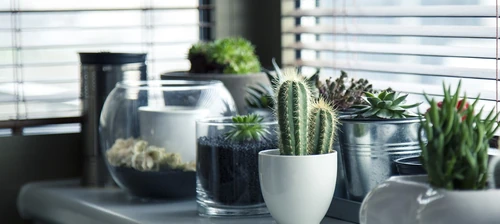Tillandsia streptocarpa, a rootless flowering plant
Tillandsia streptocarpa is an epiphytic plant native to Bolivia, Argentina, Peru, Paraguay and Brazil. Like many members of the Bromeliaceae family, it has no roots and needs no soil to grow. It prefers to cling to other plants. If you don't have a companion to give it, this herbaceous plant will thrive in suspension or in a terrarium.
How to recognize Tillandsia streptocarpa?
Tillandsia streptocarpa has a short stem. It has white scales at its base. The plant measures between 20 and 30 centimetres wide and 25 centimetres high.
Unlike Tillandsia ionantha, the foliage of Tillandsia streptocarpa does not grow in a rosette, but helically from the stem. The twisted leaves can reach 25 centimetres in length, but are no wider than two centimetres. The greenish-grey blades are triangular and slightly curved. The leaf sheath is brown.
In its natural environment, the plant flowers in summer. Spikes appear on the tall flowering stem. Each one supports up to eight flowers, violet, white or blue depending on the variety. They fill the air with their fragrance.
Tillandsia are non-toxic to humans and their pets. Tillandsia streptocarpa, like its cousin spanish Moss, is a daughter of the air: it purifies the atmosphere by capturing its humidity.
Our maintenance tips
Tillandsia streptocarpa is an epiphytic plant. It requires special watering and repotting techniques.
Watering
Your Tillandsia streptocarpa does not draw water from its roots, but from its leaves.
Mist the foliage with room-temperature water to nourish your Tillandsia streptocarpa. Its favorite meal? Recovered rainwater. It provides all the nutrients it needs for healthy growth. If you don't have any, you can use bottled water with a low mineral content.
If you notice water stagnating in the heart of the plant, blot it gently with absorbent paper.
To find out if you're watering your Tillandsia streptocarpa sufficiently, look at the foliage. Rolling leaf blades are a sign that the plant is thirsty. Conversely, yellowing and drooping leaves indicate excess water.
Repotting
Your Tillandsia streptocarpa has no roots. This epiphytic plant requires special repotting. Simply place it on its support: a piece of wood, a stone, a shell... Don't use glue or nails to fix it. It attaches itself naturally to the material.
Fertilization
Fertilizer is an essential source of nutrients for your Tillandsia streptocarpa. Top up spray water with orchid fertilizer.
Prune
Remove wilted flowers as and when they appear, to encourage the emergence of new inflorescences.
Cutting
Cutting is carried out during the strong growth phase, generally in spring and early summer.
The mother plant produces shoots. Separate them with a clean knife. Leave to dry for 24 to 48 hours in the open air, until a wedge forms at the base.
Prepare a pot lined with a mixture of potting soil, peat and pine bark. The pot does not need to be pierced. Place your cutting in the center.
Place your cutting in a heated room, in a bright spot away from direct sunlight. Spray regularly, as for a mature plant.
Diseases / Threats
Information
| Family | Bromeliads - Bromeliaceae |
| Type | Daughter of the air - Tillandsia |
| Species | Tillandsia streptocarpa - Tillandsia streptocarpa |
| Lifecycle | Perennial |
| Foliage | Evergreen |
| Exposures | |
| Categories | |
| Tags |
Beginner Flowery |
| Origin |
South America |
| Hardiness (USDA) | 11a |
| Leaf color |
|
| Flower colors |
|
Discover plants from the same family
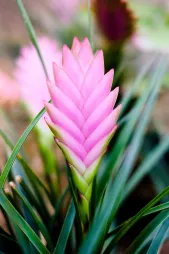
Tillandsia racket
Discover
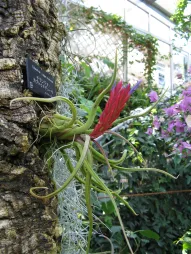
Jellyfish head
Discover
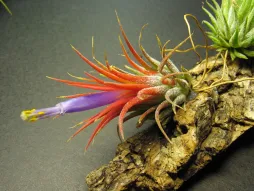
Tillandsia ionantha
Discover
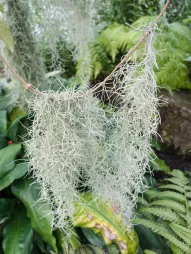
Spanish moss
Discover










